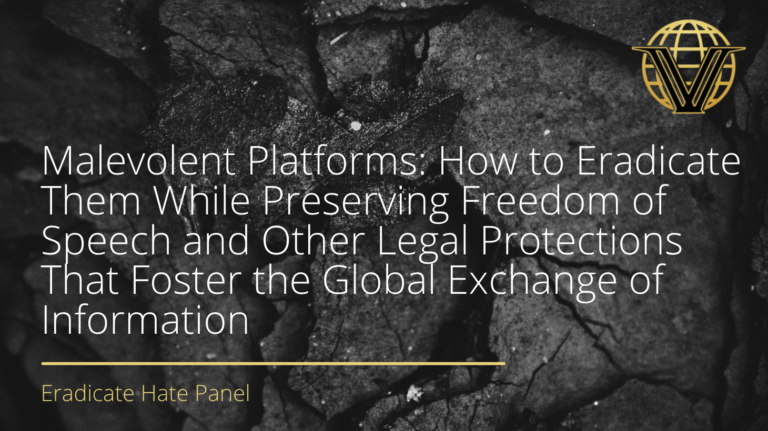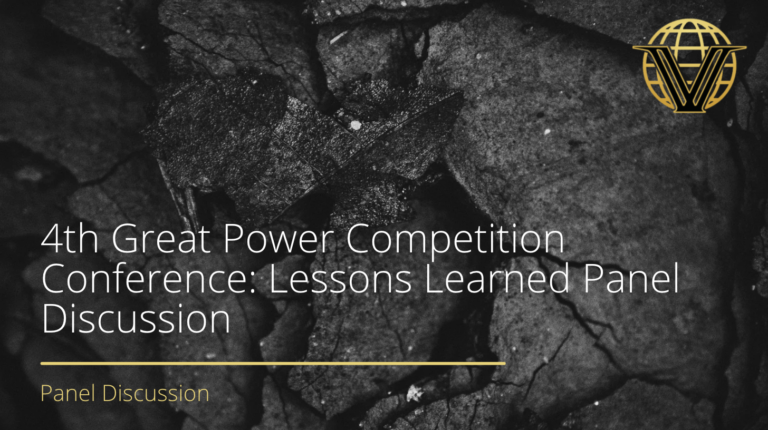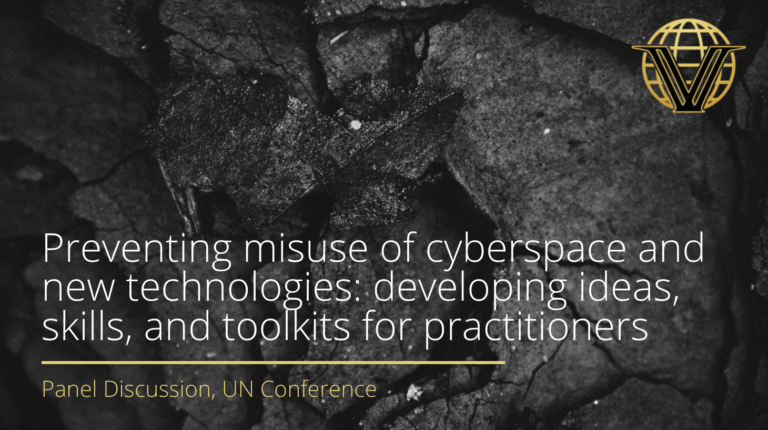Daveed Gartenstein-Ross
On Monday, June 15, 2020, Valens Global hosted a panel featuring Major General (Retired) Allen Batschelet, former Acting Secretary of Homeland Security Kevin McAleenan, Dr. Kim Cragin of National Defense University, and New York Times best-selling author Max Brooks. The panel was moderated by The Wall Street Journal’s Nancy Youssef, and concluded with remarks by Valens Global CEO Dr. Daveed Gartenstein-Ross.
In his concluding remarks, Daveed underscored five key takeaways that he found to be particularly relevant. The following, excerpted from his conclusion, summarizes the panel discussion:
“The first [takeaway] is how violent non-state actors think, how they adapt to crises like the pandemic. Dr. Cragin, in her very first remark, talked about how there’s a debate about whether militant groups are strategic or opportunistic, and she said, and I agree entirely, that they’re both. A good militant group is going to be strategic, and, in part, it’s strategic by being opportunistic. At Valens, when we talk about violent non-state actors, when we look at opportunities that they may enjoy or things that may disrupt their plans, we discuss them as continuities and also discontinuities. Discontinuities present the most room for growth, and tend to help the most entrepreneurial organizations. The pandemic itself has, of course, been a striking discontinuity. There are going to be other discontinuities that result from this pandemic. And if anything, the changes that are going to be wrought by the pandemic are difficult to fully foresee, and difficult to fully appreciate, because it’s hard to stretch our minds as far as they need to stretch. This is the period that we’re in, in which we may not know what the wrenching changes may be, but it’s easy to project that other wrenching changes are coming.
“At Valens, for a while we’ve talked about Black Swan Events internally. But instead, we are now talking about Grey Swan Events because it’s very easy to predict that the unpredictable will occur. To continue with another reference to Nassim Nicholas Taleb’s work—he is the progenitor of the idea of Black Swan Events—another of his books is called Anti-Fragile. It focuses on things that benefit from disorder. Most violent non-state actors, though not all, are generally anti-fragile. As Kevin alluded to, transnational criminal organizations, given their business model, may be less anti-fragile than, for example, terrorist groups. One game that I love to play is chess, which isn’t a game of tactics, it’s really a game of space. Space is what allows you to understand when the transition occurs from building your position to striking tactically, usually very quickly. Disorder tends to improve the space that violent non-state actors have, and thus magnify the number of options that they enjoy.
“So, I’m going to make one projection here. You know, Max had said that only an arrogant idiot would predict at this point, to which I say: Challenge accepted! So, I’ll make a few projections, bearing in mind in seriousness that my degree of confidence in these projections isn’t particularly high. But one of the violent non-state actors we talked about is jihadist organizations. My projection for them for the immediate future is that while gaining rural territory is sensible, I expect they will be less aggressive about gaining urban territory, because then they put themselves in a position where they would own a COVID-related disaster where right now, they don’t. We’ll see if I end up being an idiot for making that projection.
“Second, I think that there are different ways of understanding possible futures, both short- and long-term, that have been discussed here. This is where my strong endorsement of Max and his work comes into play. I’ve learned a lot from him about the art of world-building through our conversations, which is something that we incorporate into, for example, the war games or strategic simulations that we sometimes host. I think it’s necessary to be able to think through the realm not only of the likely, but also the possible. And one of my big critiques of the way analysis typically proceeds is it tends to be risk averse. It tends to focus on the likely, it tends to ignore the possible. We all understand that we’re in a world in which things are increasingly unpredictable. Thus, I think incorporating greater creativity into the art of analysis is essential to doing it right in the twenty-first century, and to getting answers that will be useful, and that will endure the test of time.
“The third thing I’ll point to is learning from history. I’ll go back to something Nancy said when she was introducing the panel. She talked about the Arab Spring, and the failure of imagination that occurred a decade ago, when we were looking at those revolutionary events. I’ve spoken about that series of events a number of times, probably in part because I was struck at the time by the hostility I met when I was warning about the way that militant groups might adapt to those revolutions, as though warning what they may do was wanting them to succeed, or wanting the revolutions to fail. We have a series of different revolutionary moments in the world right now. And I think that the obligation of people who are trying to understand the world is to do just that, to try to understand positive and negative things that could result from every strategic situation, and to deliver them with the utmost rigor, and to scrupulously test themselves. I think history suggests that people don’t always do that, especially when you’re in a situation where emotions ride high. To me, being able to deliver the right answers that will endure the test of time is extraordinarily important and often it’s getting outside of any box that you’re in, whether it’s being too risk averse or not creative enough, that’s essential for doing that.
“We turn fourth to VNSAs’ use of technology, something that was discussed by a few people. Dr. Cragin mentioned virtual plotters, that is people normally associated with ISIS, operatives abroad who try to fulfill all the old functions of a physical terrorist network through the digital space: looking to recruit people online, making use of end-to-end encryption to encourage operatives to carry out attacks and help them to select the target at the timing of attacks. Our assessment is that terrorist groups like ISIS right now are leaning more heavily into the virtual plotter model, in part due to the pandemic and the difficulty of moving operatives across borders. Also in terms of VNSAs’ use of technology, Kevin spoke about transnational criminal organizations and their adaptations at the borders. So far, we assess unmanned aerial systems as part of their attempts. Use of UAS may not sustain, but technology is one of the early adaptations that we’ve seen them employ.
“And one final thing that undergirded many of these comments is the online propaganda space. There is VNSAs’ use of the space, but also, there are state efforts, and particularly Russia’s, which may be even more significant than the efforts of VNSAs. The efforts of states like Russia today fundamentally intersect with violent extremism. I had the distinct honor of working with Kevin on the 2019 Department of Homeland Security Strategic Framework for Countering Terrorism and Targeted Violence, supporting his production of that framework. And that framework talks about the way that states increasingly perceive fault lines within our society, and try to use the digital space to exploit it. This is an essential dynamic to continue watching. I believe that their efforts will become more rather than less intense, and that without technology companies and others making a significant effort to counter this, that this will grow in strategic significance, and will grow in terms of the cost inflicted on our nation.
“And then fifth, and finally, I’m glad that this conversation underscored the legitimacy problems that governments have, and the trouble that governments have in adapting in the twenty-first century. All the panelists alluded to this in some way. As Nancy asked, do we need another way of doing business? One thing I’ve referred to a few times in my own work is violent non-state actors, essentially, as startup firms in the political organizing space, while state actors often function as legacy industries. That is, VNSAs tend to have the kind of advantages that startup firms enjoy. They’re able to shift very strategically, and very quickly. They’re de-bureaucratized and able to ride technological waves, able to adapt to rapidly changing circumstances. States often look like legacy industries, very bureaucratically hamstrung, very risk averse, and at least at a tactical level, violent non-state actors will often run circles around them. Often they won’t, to be very clear, but often they will. We saw that, for example, with ISIS’s propaganda vs. the U.S.’s attempted responses in the 2014 to 2015 period. Ultimately, when the surface web became hostile to ISIS, that dynamic shifted. ISIS’s propaganda became less effective, but there was a period where clearly the startup firm in the political organizing space was winning out over the legacy industry, at least in the realm of digital propaganda.
“I think that the twenty-first century will see different forms of political organization emerge. Max mentioned a crisis of liberal democracy, a crisis of state legitimacy. Given the ability to organize quickly and deeply online, we may see such phenomena emerge as micro-states: states that suddenly spring up, gain some degree of international recognition, perhaps universal, based around an idea. The kinds of startup ideas and values and principles that go into companies may well, in the twenty-first century, start going into states as people self-select their new communities. It’s also possible, as Gen. Batschelet referred to, that we may be entering into a post-Westphalia world. I think looking at the world that existed prior to the Peace of Westphalia is extremely informative, at the very least, of those potential things that may happen in the twenty-first century.
“Essentially, we live in an extraordinarily complex world beset by multiple crises. If there’s one thing I’m suspicious of above all else, intellectually, it’s probably the tendency to oversimplify, which is one of the tendencies of the day. Marshall McLuhan famously said that ‘the medium is the message,’ and public sphere thinking has in many ways come to replicate the inch-deep, mile-wide, and highly reactive method of thinking that characterizes the social media sphere. There are no easy answers to most of the questions raised on this panel, but some of them, I think we can say, will be determinative of our future.”



